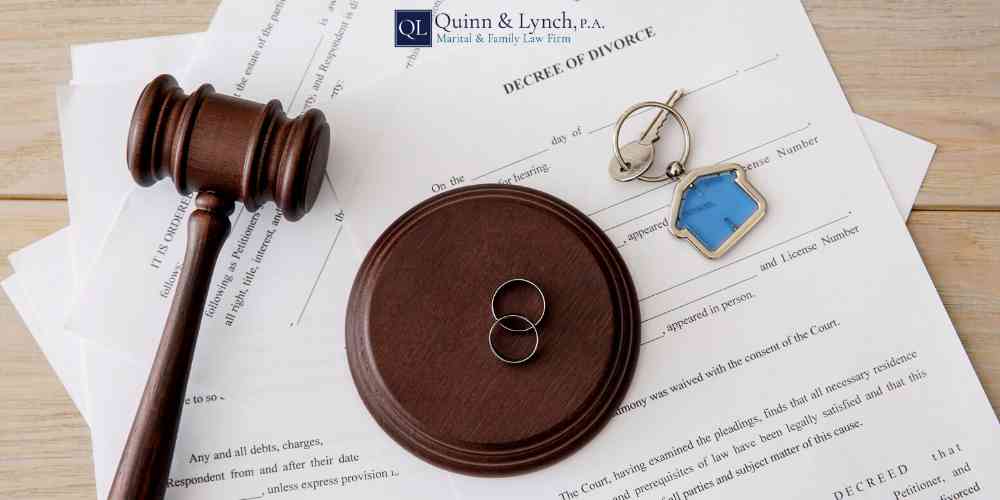Tampa Property Division Lawyer
Home » Tampa Divorce Attorney » Tampa Property Division Lawyer
Practice Areas
When facing the intricate and often emotionally challenging property division process during a Florida divorce, you need a skilled Tampa property division lawyer. At Quinn & Lynch P.A., we specialize in family law and deeply understand Florida’s property division laws.
Our team of dedicated family law attorneys is committed to providing expert guidance, negotiation, mediation, and, when necessary, litigation support to ensure your interests are protected and your financial future is secured. Our unwavering commitment to protecting your rights and tailoring our approach to your unique circumstances makes us your trusted advocates during this challenging time.
Call our Tampa property division lawyers at 813-223-7739 to schedule a consultation today.

What is Marital Property?
Marital property constitutes a pivotal concept in divorce proceedings. It includes the marital assets and liabilities incurred during the marriage, owned jointly by both spouses. Marital property typically encompasses a wide range of assets acquired, including income, real estate, personal property, and financial accounts throughout the marriage.
Florida law has spousal rights, specifically allowing spouses to share both the marital assets and the liability incurred, even if they only include one spouse’s name. For example, if one spouse has thousands of dollars of credit card debts acquired with only their name on it, both spouses may be responsible for these debts accumulated during the marriage (unless the court discovers that the other spouse has hidden assets or wasted marital funds).
Understanding the distinction between marital and separate property is essential, as it forms the basis for equitable property division during a divorce. Quinn & Lynch P.A., as your dedicated Tampa property division attorneys, can guide you through the nuances of property acquired during the marriage and ensure that your rights and interests are safeguarded.
Is Florida a Community Property State?
Florida is not a community property state; instead, Florida law adheres to the principle of equitable division. Equitable distribution considers various factors to determine how marital debts and assets should be divided, ensuring that each spouse’s unique circumstances are considered.
Navigating the complexities of Florida law requires the expertise of a Tampa property division attorney, such as those at Quinn & Lynch P.A., who can help you achieve a fair and balanced outcome in your divorce proceedings.
Equitable Distribution in Florida
Florida law is guided by a set of principles designed to ensure that the division is just and equitable. When making decisions about property division, judges in Tampa consider various factors to determine what distribution would give each party their fair share under the specific circumstances of each case.
Factors That Judges Consider When Dividing Property
For property division in Tampa, Florida, judges consider several crucial factors to ensure a fair and equitable distribution. These factors include:
Duration of the Marriage: The span plays a significant role in property division, with longer marriages often leading to more even distributions.
Economic Circumstances: The court considers the economic situations of each spouse, including income, future earning potential, overall financial stability, and interruptions in personal careers or educational opportunities. If one party contributes to the personal career or educational opportunity of the other party, this may affect the division.
Assets and Liabilities: The value of assets and debts, including real estate, investments, and liabilities incurred, is carefully evaluated.
The Desirability of Keeping Certain Assets: The court may weigh the importance of retaining specific assets, such as a business, professional practice, or marital home, particularly when dependent children are involved.
Factors That May Result in an Unequal Division of Marital Assets
In certain divorce cases in Florida, judges may deem it necessary to deviate from a fair and equitable distribution, considering relevant factors that could result in a purely unequal distribution.
Some of these factors include:
Misconduct or Intentional Dissipation: If one spouse engaged in misconduct, such as wasting marital assets or committing financial fraud, such as using the unauthorized signature of their spouse, it could impact the distribution.
Health and Age: The health and age of the parties involved can influence the distribution, with older or ill spouses potentially requiring more financial support.
Child Custody and Support: The court may consider the child custody or time-sharing arrangement and the children’s financial needs when making property division decisions. These factors can lead to an uneven distribution that ensures the well-being of the children involved. Be sure to consult with our Tampa child custody attorneys for more information.

Separate vs. Marital Property in Florida
Distinguishing between marital and non-marital property is critical in property division cases.
Examples of Separate Property in Florida
Separate property refers to assets acquired separately, inheritances or gifts received individually during the marriage, and assets designated separately in a valid prenuptial or postnuptial agreement. In Florida, this non-marital property is typically not subject to division during a divorce.
Some common examples of nonmarital property or liabilities excluded in Florida include:
Pre-Marital Assets: Any assets owned by either spouse before the marriage, such as nonmarital real property, savings account, or investments, provided they were not commingled.
Inheritances: Money or assets received through inheritance, provided it was not commingled.
Interspousal Gifts: Gifts given to one party individually, as long as they were not intended for the other party, both spouses or commingled with marital assets. It’s important to keep records of such assets or gifts to demonstrate their separate nature in case of a divorce.
Examples of Marital Property in Florida
Marital property in Florida encompasses assets and debts acquired during the course of the marriage, and it is subject to equitable distribution during divorce proceedings.
Some common examples of this include:
Income and Savings During Marriage: money earned by either spouse during the marriage, including salary, bonuses, and investments
Real Estate Acquired During Marriage: homes and other properties purchased during the marriage, regardless of whose name is on the title
Funds Acquired During Marriage in Bank Accounts: funds acquired during marriage or income derived from marital assets in bank accounts, regardless of the source of the funds
Retirement Accounts: the portion of retirement accounts, such as 401(k)s and IRAs, acquired before the marriage may be considered nonmarital assets, while the portion accumulated during the marriage is marital.
Can You Change Separate Property Into Marital Property in Florida?
In Florida, the distinction between separate and marital property is crucial to property division during divorce. While rare, there are situations where commingling or transmutation can occur, potentially converting separate assets into marital property.
Commingling involves mixing separate assets with marital assets, making it difficult to trace or separate the original property. Conversely, transmutation involves a deliberate and documented agreement between spouses to change the classification of a certain asset from a separate to a marital asset.
Such changes are complex legal matters, and if you have concerns or questions about the status of your assets in a divorce, it’s advisable to consult with a Tampa property division attorney who can provide guidance based on your specific circumstances.
Why You Need a Tampa Family Law Attorney for Property Division

Navigating the complexities of property division during a divorce can be overwhelming, and the outcome can significantly impact your financial future. That’s where a skilled Tampa divorce attorney from Quinn & Lynch P.A. can make all the difference.
Expertise and Guidance
Our experienced family law attorneys in Tampa deeply understand Florida’s property division laws. We can provide the expertise needed to ensure all property is properly characterized and advocate for a fair distribution of assets.
Collaborative Divorce and Mediation
Property division can often be resolved through mediation or collaborative divorce. Our Tampa divorce mediation attorneys and Tampa collaborative divorce attorneys excel in these alternative dispute resolution methods.
Litigation Support
Our dedicated legal team will vigorously represent you in court when litigation is necessary for a property settlement agreement. We will gather evidence, present your case persuasively, and work tirelessly to secure the best possible outcome.
Protecting your Rights
Our primary goal when representing clients is to protect their rights and secure a property division outcome that aligns with their needs and priorities. We understand that every case is unique and tailor our approach to ensure our clients’ specific circumstances are considered.
Call a Tampa Property Division Lawyer at Quinn & Lynch P.A. Today

Property division during divorce is a complex legal matter that requires expert guidance to ensure a fair and just outcome. If you are facing divorce in Tampa, Florida, and need assistance with equitably dividing property, the experienced Tampa property division lawyers at Quinn & Lynch P.A. are here to help. Contact a Tampa property division lawyer at 813-223-7739 today to schedule a consultation and take the first step toward securing your financial future after divorce.
Our dedicated team will work tirelessly to protect your rights and interests throughout the entire property division process.
Contact Our Experienced, Dedicated Divorce & Family Law Lawyers Today
As a dedicated family law practice in the Tampa Bay area, we work one on one with our clients, resulting in representation that is characterized by genuine care and understanding. If you are dealing with divorce or other family law issues, please contact at 813-223-7739 to schedule an appointment with one of our experienced family and divorce attorneys.















